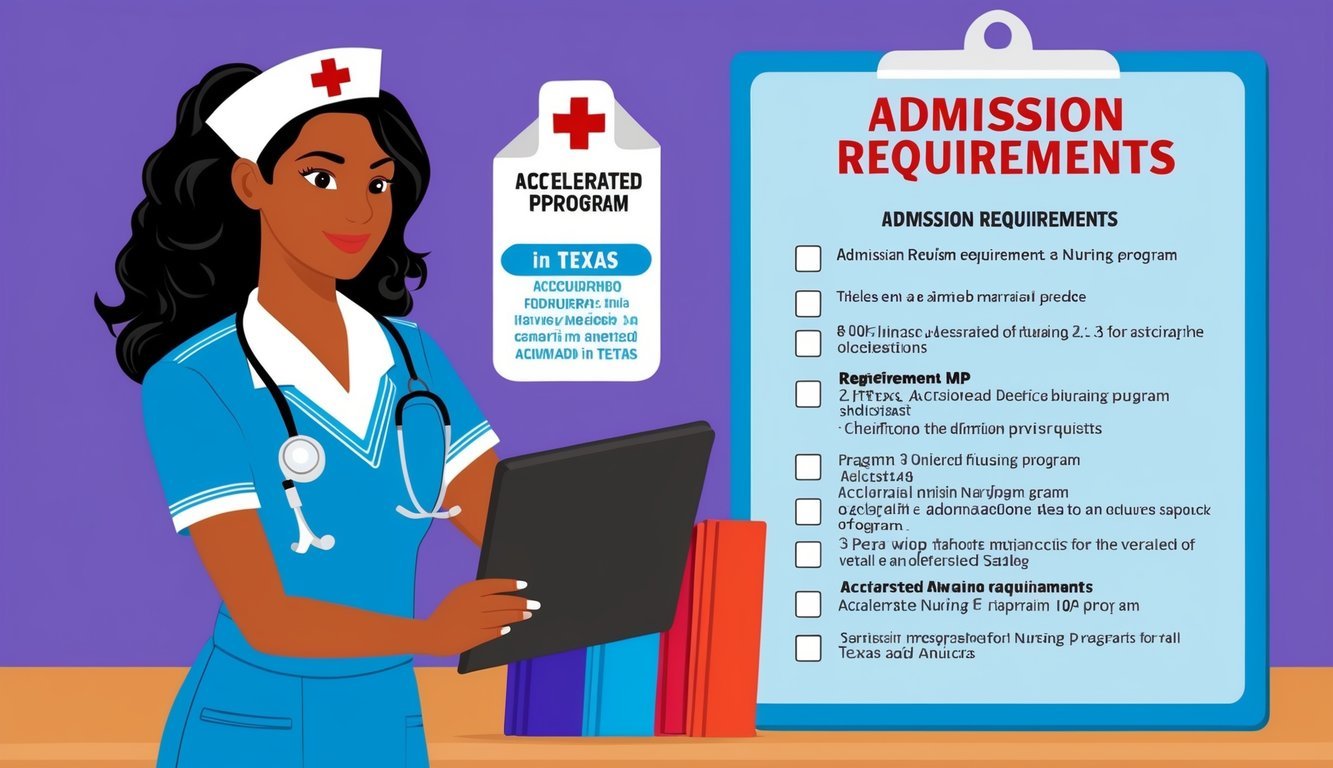Accelerated nursing programs in Texas offer a unique pathway for individuals seeking to transition into the nursing field swiftly.
These programs enable you to earn a Bachelor of Science in Nursing (BSN) in a condensed timeframe, often within 15 to 18 months.
This fast-track education not only equips you with essential nursing skills but also opens doors to a rewarding career in healthcare.
As a career changer, enrolling in an accelerated nursing program allows you to leverage your previous education and experiences while focusing on a new direction.
Many universities, such as Texas A&M University and the University of Texas Health Science Center, have designed their curriculum to integrate hands-on clinical practice with academic learning.
By doing so, you can immerse yourself in the nursing profession and gain practical skills vital for your future role.
Not only do these programs address the nursing shortage in Texas, but they also provide a supportive environment for students motivated to make a significant career change.
Whether you’re coming from a different field or looking to enhance your qualifications, the time to consider this opportunity is now.
You can find detailed comparisons of programs available through resources such as Nursing Process and Nurse.org.
Understanding Accelerated BSN Programs in Texas
Accelerated BSN programs in Texas offer a fast-tracked path for individuals seeking a Bachelor of Science in Nursing.
These intensive programs provide an alternative route for those who already hold a bachelor’s degree in another field, aiming to transition into nursing quickly and efficiently.
Overview of Accelerated BSN
Accelerated BSN programs typically last between 12 to 18 months and are designed for students who are committed to full-time, intensive study.
The curriculum includes coursework in nursing theory, clinical practices, and patient care techniques.
Many universities in Texas, such as Texas A&M University and Baylor University, offer dynamic ABSN options that blend classroom instruction with hands-on clinical training.
The structure of these programs helps you to build essential nursing skills rapidly, preparing you for the workforce.
Benefits of an Accelerated Path
Choosing an accelerated path toward a BSN offers several advantages:
- Time Efficiency: Complete your degree in a shorter time frame compared to traditional programs.
- High Demand: Graduates are in high demand due to the ongoing nursing shortage in Texas.
- Career Opportunities: This degree opens doors to various nursing roles, enhancing your employability.
Furthermore, these programs often include preparation for the NCLEX exam, ensuring you’re ready to become a licensed registered nurse upon graduation.
Prospective Students: Who Should Consider Accelerated BSN?
Accelerated BSN programs are ideal for individuals who have a non-nursing bachelor’s degree and are looking for a career change.
If you possess a strong desire to enter the nursing field and are willing to commit to an intensive full-time program, this route may suit you well.
Ideal candidates are typically:
- Motivated and dedicated to their studies
- Able to handle a rigorous academic workload
- Prepared for a fast-paced learning environment
By considering your career goals and personal circumstances, you can determine if an accelerated BSN program aligns with your aspirations in nursing.
Admission Requirements and Prerequisites

Understanding the admission requirements and prerequisites for accelerated nursing programs in Texas is essential for a successful application.
This section outlines key eligibility criteria, required courses, and the application process you need to be familiar with.
Eligibility Criteria
To be eligible for accelerated nursing programs in Texas, you must hold a non-nursing bachelor’s degree from an accredited institution.
Most programs require a minimum GPA, typically around 3.0 on a 4.0 scale.
Additionally, many schools may expect you to have completed specific coursework in the sciences and humanities.
Some programs also consider work experience in healthcare settings as an advantage.
Many institutions have specific deadlines for application submissions, so it is advisable to check each program’s individual requirements for additional details.
Required Prerequisite Courses
Typically, you need to complete several prerequisite courses before applying.
Key courses often include:
| Course | Description |
|---|---|
| Anatomy and Physiology | Fundamental understanding of human body systems. |
| Microbiology | Basics of microorganisms and their impact on health. |
| Statistics | Introduction to statistical methods for data analysis. |
| Developmental Psychology | Understanding human development across the lifespan. |
Each program may have its own set of required courses.
It is important to review the specific prerequisites listed by the school you are interested in.
Application Process
The application process usually consists of multiple steps:
- Gather Transcripts: You must provide official transcripts from all post-secondary institutions attended.
- Letters of Recommendation: Most programs require 2-3 professional or academic references.
- Personal Statement: A personal essay outlining your motivations and goals in pursuing nursing is often required.
- Interview: Some schools may conduct interviews as part of the admissions process.
Be sure to check each program’s website for specific details on deadlines and application submission methods.
For example, programs like Baylor University’s ABSN provide detailed information about their admission requirements.
Curriculum and Clinical Experience

The curriculum of accelerated nursing programs in Texas is designed to provide you with a comprehensive education that includes both theoretical knowledge and practical skills.
You’ll engage in a blend of nursing coursework and hands-on clinical practice to prepare you for a successful career in nursing.
Key Components of Nursing Curriculum
The nursing curriculum typically covers essential topics critical for your nursing practice.
Core coursework may include:
- Adult Nursing: Focuses on the care of adult patients, covering diseases, treatments, and patient management.
- Mental Health Nursing: Emphasizes the importance of mental health in overall well-being, teaching you to care for patients with psychological disorders.
- Evidence-Based Practice: Encourages you to rely on research to guide your clinical decisions, ensuring high-quality patient care.
You will also explore subjects like pharmacology, health assessment, and nursing ethics.
This rigorous academic foundation prepares you for real-world challenges.
Gaining Hands-on Experience in Clinical Settings
Clinical experiences are a cornerstone of your education in nursing, allowing you to apply theoretical knowledge in real-life settings.
These experiences take place in various healthcare environments, including:
- Hospitals
- Clinics
- Community health organizations
During these sessions, you will work under the supervision of experienced nurses, providing care to patients and learning essential skills.
Clinical practice reinforces your classroom learning, helping you to develop critical thinking and decision-making abilities.
Furthermore, programs may incorporate simulation labs, where you can practice procedures in a controlled environment before working with actual patients.
Specialized Nursing Areas
As you progress through your program, you may have the opportunity to explore specialized nursing areas.
These can include:
- Pediatric Nursing: Caring for infants and children, focusing on developmental and health issues.
- Geriatric Nursing: Addressing the unique needs of older adults, including chronic disease management.
- Critical Care Nursing: Working in intensive care units, handling complex cases that require advanced skills.
Each specialization typically includes targeted coursework and clinical placements, allowing you to gain focused expertise.
By the end of your program, this exposure helps you make informed decisions about your nursing career path.
Licensing and Examination

Once you complete your accelerated nursing program, you’ll need to navigate the licensing process to become a registered nurse (RN) in Texas.
This involves preparing for the NCLEX-RN exam and meeting the Texas Board of Nursing requirements.
Understanding these steps is crucial for a smooth transition into your nursing career.
Preparing for the NCLEX-RN Exam
The NCLEX-RN exam is a critical step in obtaining your RN licensure.
You should familiarize yourself with the exam format, which includes a mix of multiple-choice and alternate format questions.
Key preparation tips include:
- Study Resources: Use NCLEX review books, online courses, and practice tests to reinforce your knowledge.
- Time Management: Create a detailed study schedule that allocates time for each topic covered in the exam.
- Practice Questions: Regularly test yourself with NCLEX-style questions to build confidence and identify weak areas.
Among the subjects covered are safe and effective care, health promotion, and psychosocial integrity.
Keeping these areas in mind will help you focus your studies effectively.
Texas Board of Nursing Requirements
To be eligible for the NCLEX-RN exam, you must meet specific requirements set by the Texas Board of Nursing.
These include:
- Educational Prerequisites: You need to graduate from an accredited nursing program.
- Application Process: Submit an application for licensure by examination to the Texas Board of Nursing. You’ll need to include official transcripts and other documentation.
- Background Check: Complete a criminal background check as part of the application process.
It’s essential to familiarize yourself with the Texas Board of Nursing website for additional information on forms, fees, and timelines.
Following these steps carefully ensures that you are prepared to take the NCLEX-RN and embark on your nursing career in Texas.
Job Opportunities and Career Outlook

The landscape of nursing in Texas offers numerous opportunities, driven by a considerable demand for qualified professionals.
By understanding the job market, the impact of RN shortages, and the importance of continuing education, you can better navigate your career path as a nurse.
Navigating the Nursing Job Market in Texas
The demand for registered nurses (RNs) in Texas is notable, with 231,060 nurses currently employed statewide.
The Bureau of Labor Statistics projects a 6% increase in job openings for RNs between 2022 and 2032, resulting in approximately 193,100 new positions.
Texas is home to several medical facilities and educational institutions that create a diverse range of career opportunities.
Major hospitals, clinics, and rural health organizations often seek RNs due to their integral role in patient care.
Key employers in Texas include:
| Employer Type | Examples |
|---|---|
| Major Hospitals | Texas Health Resources, HCA Healthcare |
| Academic Institutions | Baylor University, Texas A&M University College of Nursing |
| Community Clinics | Federally Qualified Health Centers |
You should explore these opportunities to find positions that align with your interests and professional goals.
Impact of RN Shortage on Career Prospects
The RN shortage significantly influences job prospects across various healthcare settings.
As the population ages and healthcare demands increase, facilities face challenges in staffing.
This ongoing shortage means higher job security and potentially better salary offers for new graduates.
The Registered Nurses profession continues to grow, making it an attractive career path for those entering the field.
Additionally, areas with substantial RN shortages, such as rural communities, often provide incentives for those willing to work in those locations.
Opportunities stemming from the shortage include:
- Increased job openings
- Higher starting salaries
- Flexible work hours
Your adaptability and skills will be highly sought after, giving you a favorable position in the job market.
Continuing Education and Professional Development
Ongoing education and professional development are essential for advancing in your nursing career.
You may choose to pursue advanced degrees or certifications.
These can enhance your qualifications and open up specialized roles.
Continuing education not only strengthens your clinical skills but also helps you transition smoothly into professional nursing practice.
Engaging in workshops, seminars, and certification courses can keep you updated with the latest practices and technologies in nursing.
Popular areas for further education include:
- Nurse Practitioner (NP)
- Clinical Nurse Specialist (CNS)
- Nurse Educator
Consider joining professional organizations focused on nursing, such as the Texas Nurses Association, to gain resources, networking opportunities, and access to professional development programs.
Investing in your education will lead to greater career advancement and job satisfaction.

